Warning: Trying to access array offset on value of type bool in /www/wwwroot/www.medtourcn.com/wp-content/themes/medical-directory/framework/theme/medicaldirectory-image.php on line 78
Warning: Trying to access array offset on value of type bool in /www/wwwroot/www.medtourcn.com/wp-content/themes/medical-directory/framework/theme/medicaldirectory-image.php on line 79

**Chinese Biopharmaceuticals: Ushering in a New Era in Nasopharyngeal Carcinoma Treatment, EBV-Specific CAR-T Injection Approved for Phase II Clinical Trials in the US and China**
**Chinese Biopharmaceuticals: Ushering in a New Era in Nasopharyngeal Carcinoma Treatment, EBV-Specific CAR-T Injection Approved for Phase II Clinical Trials in the US and China**

Nasopharyngeal Carcinoma
#Nasopharyngeal #Carcinoma #BRG01 #CART #EBVspecific
Biosyngen has announced a milestone achievement: the company’s independently developed BRG01 injection (EBV-specific CAR-T) has received formal written approval from the U.S. Food and Drug Administration (FDA) to conduct pivotal Phase II clinical trials for the treatment of relapsed/metastatic EBV-positive nasopharyngeal carcinoma patients. This is the world’s first original cell drug for solid tumors approved in both the US and China to enter Phase II trials, bringing hope and breakthroughs to the field of solid tumor treatment.
Previously reported, the Center for Drug Evaluation (CDE) of the National Medical Products Administration has agreed to conduct pivotal Phase II clinical trials of BRG01 injection (EBV-specific CAR-T). Patients for the BRG01 US-China Phase I clinical trials completed enrollment by the end of January this year, and all trial participants have received BRG01 reinfusion treatment. The Phase I registered clinical trial of BRG01 has successfully completed DLT (dose-limiting toxicity) observation and efficacy evaluation in 9 patients, all of whom were advanced nasopharyngeal carcinoma patients who had failed at least one treatment, including PD-1 antibody immune checkpoint inhibitors.
The data shows that BRG01 has demonstrated excellent safety and preliminary efficacy: in PET-CT scans, 75% of high-dose patients experienced a local reduction in tumor lesions and a decrease in metabolic activity, with some patients achieving 100% complete remission of tumor lesions. Additionally, BRG01 also demonstrated excellent anti-EB virus efficacy, with a significant reduction of EB virus load in the peripheral blood of patients after reinfusion to normal levels.
These data not only highlight the potential of BRG01 in tumor treatment but also demonstrate its dual advantages in antiviral therapy, laying a solid foundation for future clinical applications. This is believed to be the key reason for the FDA’s approval of BRG01 to enter Phase II clinical trials.
The FDA’s approval not only highly recognizes the preliminary research results of BRG01 injection but also fully affirms Biosyngen’s innovative capabilities and research and development strength in the field of cellular immunotherapy. Biosyngen will take this as an opportunity to accelerate the clinical research process of BRG01 injection, striving to achieve the commercialization of this therapy as soon as possible to bring benefits to nasopharyngeal carcinoma patients worldwide.
Biosyngen’s layout in the field of solid tumor cell therapy goes far beyond this. The company has become a biotech enterprise with three major cellular therapies for both solid and hematological tumors: CAR-T, TCR-T, and TIL. The product pipelines have completed dual submissions and approvals in both the US and China, and the indications for the latter two include a variety of solid tumors such as lung and liver cancer.
Looking to the future, with Biosyngen’s efficient execution and rapid R&D achievements, we have reason to expect more clinical breakthroughs in solid tumor cell drugs in a shorter time, bringing new treatment hopes to patients.
🎉🎉To assess whether the condition is suitable for CAR-T or clinic therapy, you can submit Advanced Medicine in China for preliminary evaluation!
WhatsApp: +8613717959070
Email: doctor.huang@globecancer.com
#Biosyngen #CAR_T #CancerTreatment #NasopharyngealCarcinoma #FDAApproval #ClinicalTrials #MedicalBreakthrough #BiotechInnovation #CancerResearch #Immunotherapy #HealthcareInnovation #CancerHope #SolidTumors #GlobalHealth #CancerCare
Warning: Trying to access array offset on value of type bool in /www/wwwroot/www.medtourcn.com/wp-content/themes/medical-directory/framework/theme/medicaldirectory-image.php on line 78
Warning: Trying to access array offset on value of type bool in /www/wwwroot/www.medtourcn.com/wp-content/themes/medical-directory/framework/theme/medicaldirectory-image.php on line 79

22 Days from Desperation to Rebirth! Chinese CAR-T Therapy Creates Survival Miracle for Thai Multiple Myeloma Patient
22 Days from Desperation to Rebirth! Chinese CAR-T Therapy Creates Survival Miracle for Thai Multiple Myeloma Patient
In July 2017, 58-year-old Ms. M was diagnosed with multiple myeloma. After receiving treatments at the best hospital in Thailand, including PCD, DVD, bortezomib and lenalidomide, autologous hematopoietic stem cell transplantation. The disease rapidly relapsed. Local doctors informed Ms. M’s family that apart from palliative care, they were powerless.
Just as Ms. M was in dire straits, on June 30, 2023, the world’s first fully human BCMA CAR-T therapy – Equecabtagene Autoleucel, was shockingly launched in China, becoming a lifesaving straw for her. Ms. M and her family decided to seek treatment in China.
In September 2023, Professor Li Ping’s team at Shanghai Tongji Hospital developed a personalized Equecabtagene Autoleucel(BCMA CAR-T) therapy plan for Ms. M. What shocked everyone was that the examination results 22 days after CAR-T treatment showed that Ms. M had achieved hematologic CR, meaning that no cancer cells were detected in her blood. Her pain and anemia were also reversed. It was simply a miracle!
Reference:
[1]Yuting Yan, et al. Blood Adv. 2019 Oct 8;3(19):2895-2904.
[2] 2023 IMS. P-290.
Warning: Trying to access array offset on value of type bool in /www/wwwroot/www.medtourcn.com/wp-content/themes/medical-directory/framework/theme/medicaldirectory-image.php on line 78
Warning: Trying to access array offset on value of type bool in /www/wwwroot/www.medtourcn.com/wp-content/themes/medical-directory/framework/theme/medicaldirectory-image.php on line 79
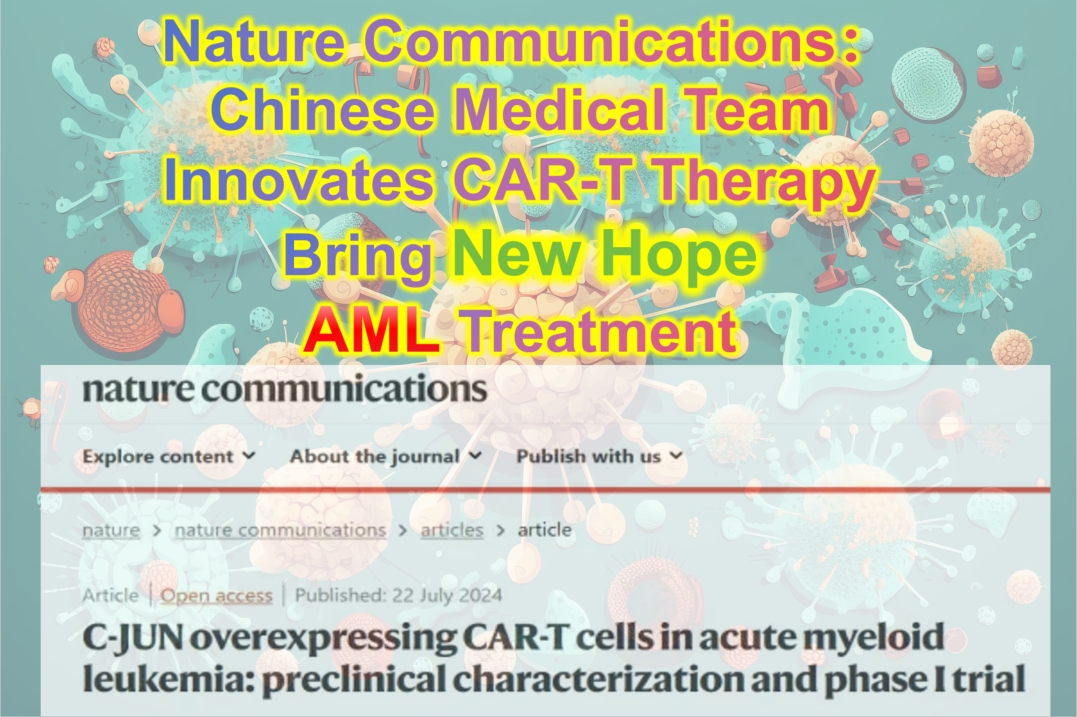
Nature Communications | Chinese Medical Team Innovates CAR-T Therapy to Bring New Hope for AML Treatment
Nature Communications | Chinese Medical Team Innovates CAR-T Therapy to Bring New Hope for AML Treatment

AML
In the field of hematological malignancies, the treatment of acute myeloid leukemia (AML) has long been a challenge in the medical community. Particularly for relapsed or refractory patients, the limitations of traditional treatments have increased the urgent need for new therapies. With the advancements in immunotherapy technology, the continuous updating of CAR-T cell therapy has brought new possibilities for the treatment of AML.
Recently, a study titled “CAR-T Cells with C-JUN Overexpression in Acute Myeloid Leukemia: Preclinical Features and Phase I Trial” was published in the journal Nature Communications. This study comprehensively explores the potential optimization mechanisms of CAR-T therapy in AML and was jointly completed by doctors and professors from three top hospitals in China.
During an interview, the Chinese medical team stated that in designing this study, they focused on the major obstacles in CAR-T cell therapy for AML. Although CD33, a highly expressed target, has been extensively explored in multiple studies, safety and efficacy remain challenges. The study found that high expression of CD155 affects the ERK signaling pathway, thereby hindering the effective expansion of CD33. To address this challenge, the research team ultimately selected the overexpression of C-JUN to enhance the exhaustion resistance of CAR-T cells by screening ERK pathway genes. Preliminary results from the clinical trial showed that this overexpressed CD33 CAR-T cell exhibited significant advantages in antitumor function.
Despite the progress, the challenges in CAR-T therapy for AML treatment were also emphasized, including the balance between high efficacy and low toxicity, the expansion of CAR-T cells in myeloid leukemia cells, and the affinity of antibody binding. Subsequent research will focus more on addressing these key issues to enable more patients to benefit from CAR-T therapy.
The Chinese clinical trials revealed some key findings of CAR-T therapy, such as the effectiveness of the bridging transplant strategy and the remarkable efficacy of CD33 CAR-T cells derived from transplant donors. These studies not only provide new insights into the application of CAR-T therapy in AML but also offer references for the optimization of therapies targeting other antigens.
The Chinese medical team will continue to conduct in-depth research around the three core issues of toxicity, expansion, and antigen binding, aiming to overcome challenges and enable more patients to benefit from the breakthrough results of CAR-T cell therapy.
����To assess whether the condition is suitable for CAR-T or clinic therapy, you can submit Advanced Medicine in China for preliminary evaluation!
WhatsApp: +8613717959070
Email: doctor.huang@globecancer.com
#CAR_TCellTherapy #AcuteMyeloidLeukemia #AMLResearch #ImmunotherapyAdvancements #ChineseMedicalInnovation #CancerTreatment #MedicalBreakthrough #NatureCommunications #OncologyResearch #HematologicalMalignancies
Warning: Trying to access array offset on value of type bool in /www/wwwroot/www.medtourcn.com/wp-content/themes/medical-directory/framework/theme/medicaldirectory-image.php on line 78
Warning: Trying to access array offset on value of type bool in /www/wwwroot/www.medtourcn.com/wp-content/themes/medical-directory/framework/theme/medicaldirectory-image.php on line 79
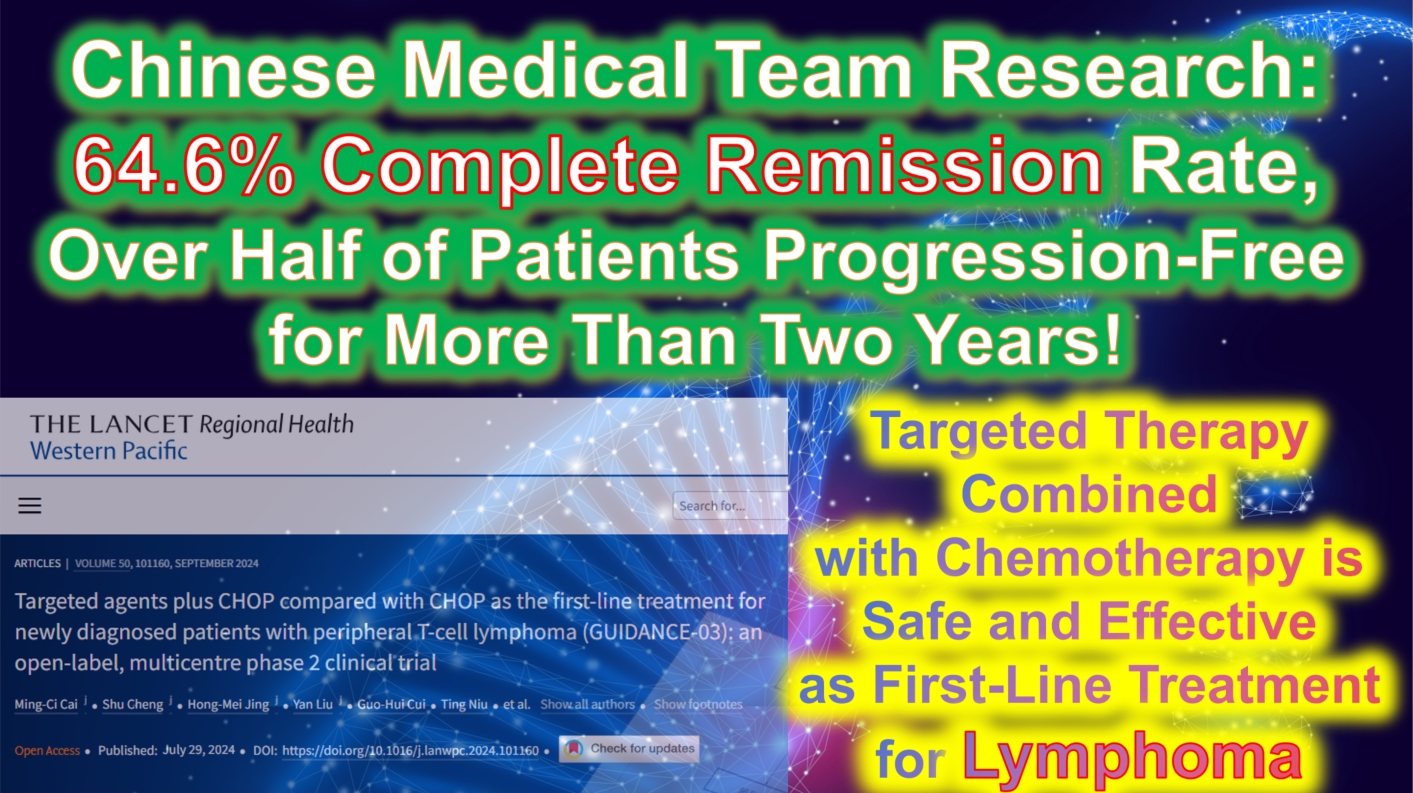
Chinese Medical Team Research: 64.6% Complete Remission Rate, Over Half of Patients Progression-Free for More Than Two Years! Targeted Therapy Combined with Chemotherapy is Safe and Effective as First-Line Treatment for Lymphoma
**Chinese Medical Team Research: 64.6% Complete Remission Rate, Over Half of Patients Progression-Free for More Than Two Years! Targeted Therapy Combined with Chemotherapy is Safe and Effective as First-Line Treatment for Lymphoma**

Lymphoma
Peripheral T-cell lymphoma (PTCL) is a group of highly aggressive and heterogeneous diseases with poor prognosis. The standard CHOP regimen (cyclophosphamide, doxorubicin, vincristine, and prednisone) is widely used as first-line treatment for PTCL. Previous studies have confirmed the safety and efficacy of combining various targeted drugs with CHOP (CHOPX) for PTCL treatment. However, there are multiple PTCL subtypes with different mutations, such as TP53, TET2, KMT2D, and CREBBP/EP300, and evidence is still lacking regarding the effectiveness of these combined treatment regimens in patients with specific genetic mutations.
Recently, a Chinese study published in *The Lancet Regional Health–Western Pacific* showed that selecting targeted therapies based on specific genetic mutations, combined with CHOP as a first-line treatment for PTCL, demonstrated good efficacy and safety. Compared to standard CHOP, CHOPX treatment achieved a higher complete remission rate and longer progression-free survival. This study was conducted by a Chinese medical team.
This was an open-label, multi-center, non-randomized, external-controlled phase 2 clinical trial (code-named GUIDANCE-03) conducted across seven medical centers in China. The trial compared the efficacy and safety of targeted drug combinations based on specific genetic mutations with CHOP (CHOPX) versus CHOP alone in newly diagnosed PTCL patients.
A total of 96 newly diagnosed PTCL patients (aged ≥18 years, median age 63 years) were enrolled in the study, with 48 patients in each group (CHOPX and CHOP). Genetic sequencing results showed that 93 patients (96.9%) carried genetic mutations. Patients in the CHOPX group received standard CHOP treatment during the first treatment cycle. Starting from the second cycle, targeted drugs were added based on the patient’s specific genetic mutations: decitabine (for TP53 mutations), azacitidine (for TET2/KMT2D mutations), chidamide (for CREBBP/EP300 mutations), and lenalidomide (for patients without these mutations), with a total of six treatment cycles. Patients in the CHOP group received six cycles of CHOP treatment.
The primary endpoint of the study was the complete remission rate (CRR) at the end of treatment. Secondary endpoints included overall response rate (ORR), progression-free survival (PFS), overall survival (OS), and safety. The analysis results showed:
– At the end of treatment, the CRR of the CHOPX group was superior to that of the CHOP group. Compared to the CHOP group, the CHOPX group saw an approximate 30% improvement in CRR (64.6% vs. 33.3%, OR 0.27, 95% CI 0.12-0.64; P=0.004), achieving the primary endpoint of the study.
– For secondary endpoints, the ORR of the CHOPX group was better than that of the CHOP group (66.7% vs. 52.1%).
– During a median follow-up period of 24.3 months, the median PFS of the CHOPX group was significantly longer than that of the CHOP group (25.5 months vs. 9.0 months; HR 0.57, 95% CI 0.34-0.98; P=0.041), with a 43% reduction in the risk of disease progression or death. The 2-year PFS rates for the two groups were 53.2% (95% CI 38.7-67.7) and 28.0% (95% CI 13.6-42.3), respectively.
In terms of OS, the median OS for the CHOPX group has not yet been reached, while the median OS for the CHOP group was 30.9 months. The CHOPX group showed a trend toward improved OS, but the current statistical results are not significant (HR 0.55, 95% CI 0.28-1.10; P=0.088). The 2-year OS rates for the two groups were 68.0% and 60.8%, respectively.
Regarding safety, neutropenia was the most common adverse event in both the CHOPX and CHOP groups (82% in the CHOPX group and 73% in the CHOP group). The most common grade 3-4 hematologic adverse event in both groups was neutropenia, and the most common grade 3-4 non-hematologic adverse event was infection. In the CHOPX group, 65% (31 patients) reported neutropenia, but no patients experienced prolonged neutropenia (>14 days) or required dose adjustments of the targeted drugs, and 10% (5 patients) experienced infections. In the CHOP group, these proportions were 52% (25 patients) and 4% (2 patients), respectively.
In conclusion, the study results indicate that different targeted drugs combined with CHOP demonstrate good efficacy and safety. These findings provide preliminary evidence supporting the use of CHOPX as a first-line treatment for PTCL patients with different genetic mutations, and suggest that biomarker-driven treatment strategies are feasible and worth further exploration in the future.

 To assess whether the condition is suitable for CAR-T or clinic therapy, you can submit Advanced Medicine in China for preliminary evaluation!
To assess whether the condition is suitable for CAR-T or clinic therapy, you can submit Advanced Medicine in China for preliminary evaluation!
WhatsApp: +8613717959070
Email: doctor.huang@globecancer.com
#CancerResearch #LymphomaTreatment #PTCL #TargetedTherapy #Chemotherapy #MedicalBreakthrough #Oncology #ClinicalTrials #ChineseMedicine #CancerSurvivorship #HealthcareInnovation #PrecisionMedicine #CancerTreatment #MedicalResearch #CHOPTherapy #OncologyUpdates #CancerCare
Warning: Trying to access array offset on value of type bool in /www/wwwroot/www.medtourcn.com/wp-content/themes/medical-directory/framework/theme/medicaldirectory-image.php on line 78
Warning: Trying to access array offset on value of type bool in /www/wwwroot/www.medtourcn.com/wp-content/themes/medical-directory/framework/theme/medicaldirectory-image.php on line 79

Overcoming Challenges and Embracing New Life! – Breakthrough Progress of Eque-cel in the Treatment of Refractory Multiple Myeloma
### Overcoming Challenges and Embracing New Life! – Breakthrough Progress of Eque-cel in the Treatment of Refractory Multiple Myeloma

Multiple Myeloma
In the treatment of multiple myeloma (MM), how do we find new breakthroughs for patients who have not achieved complete remission (CR) after multiple rounds of chemotherapy? Research by Chinese medical professors has provided an exciting answer: Eque-cel (BCMA CAR-T therapy).
**Patient Background:**
This 58-year-old female patient was initially admitted to the hospital due to numbness and pain in both lower limbs and was eventually diagnosed with multiple myeloma. Despite receiving various treatment regimens, including VRD and SVPD, the results were unsatisfactory, and complete remission was not achieved. Faced with refractory characteristics, the doctors decided to try a more innovative treatment plan—CAR-T cell therapy.
**Treatment Process:**
In September 2023, the patient began peripheral blood mononuclear cell collection, followed by bridging therapy, and in November 2023, she received the Eque-cel infusion. Remarkably, just one month later, the patient achieved hematologic complete remission (CR) with minimal residual disease (MRD) negativity. After six months of follow-up, the patient maintained this excellent therapeutic effect.
**Professor’s Insights:**
Chinese medical professors pointed out that the advent of Eque-cel has brought new hope to refractory MM patients. The drug demonstrated significant efficacy in the FUMANBA-1 study: the overall response rate was as high as 98.9%, with 82.4% achieving complete remission, and 97.8% of patients achieving MRD negativity. The 12-month sustained MRD negativity rate reached 81.7%, and the PFS rate was 85.5%.
This outstanding result proves the significant advantage of Eque-cel in improving the depth of remission for MM patients, bringing hope for long-term survival to many refractory patients.
**Future Outlook:**
As the application and research of Eque-cel continue, we look forward to it providing better treatment options and survival opportunities for more MM patients. This new treatment plan is bringing a ray of hope to this stubborn disease and providing valuable experience for clinical experts worldwide.
**Stay Tuned:**
We will continue to follow the latest developments and research progress of Eque-cel, looking forward to its greater role globally, bringing hope and blessings to more patients.

 To assess whether the condition is suitable for CAR-T or clinic therapy, you can submit Advanced Medicine in China for preliminary evaluation!
To assess whether the condition is suitable for CAR-T or clinic therapy, you can submit Advanced Medicine in China for preliminary evaluation!
WhatsApp:+8613717959070
Email: doctor.huang@globecancer.com
#MultipleMyeloma #CARTTherapy #MedicalBreakthrough #EqueCel #CancerTreatment #MedicalResearch #Hematology #PatientCare #OncologyInnovation #HopeForPatients #BCMA #CART #MM #RRMM
Warning: Trying to access array offset on value of type bool in /www/wwwroot/www.medtourcn.com/wp-content/themes/medical-directory/framework/theme/medicaldirectory-image.php on line 78
Warning: Trying to access array offset on value of type bool in /www/wwwroot/www.medtourcn.com/wp-content/themes/medical-directory/framework/theme/medicaldirectory-image.php on line 79
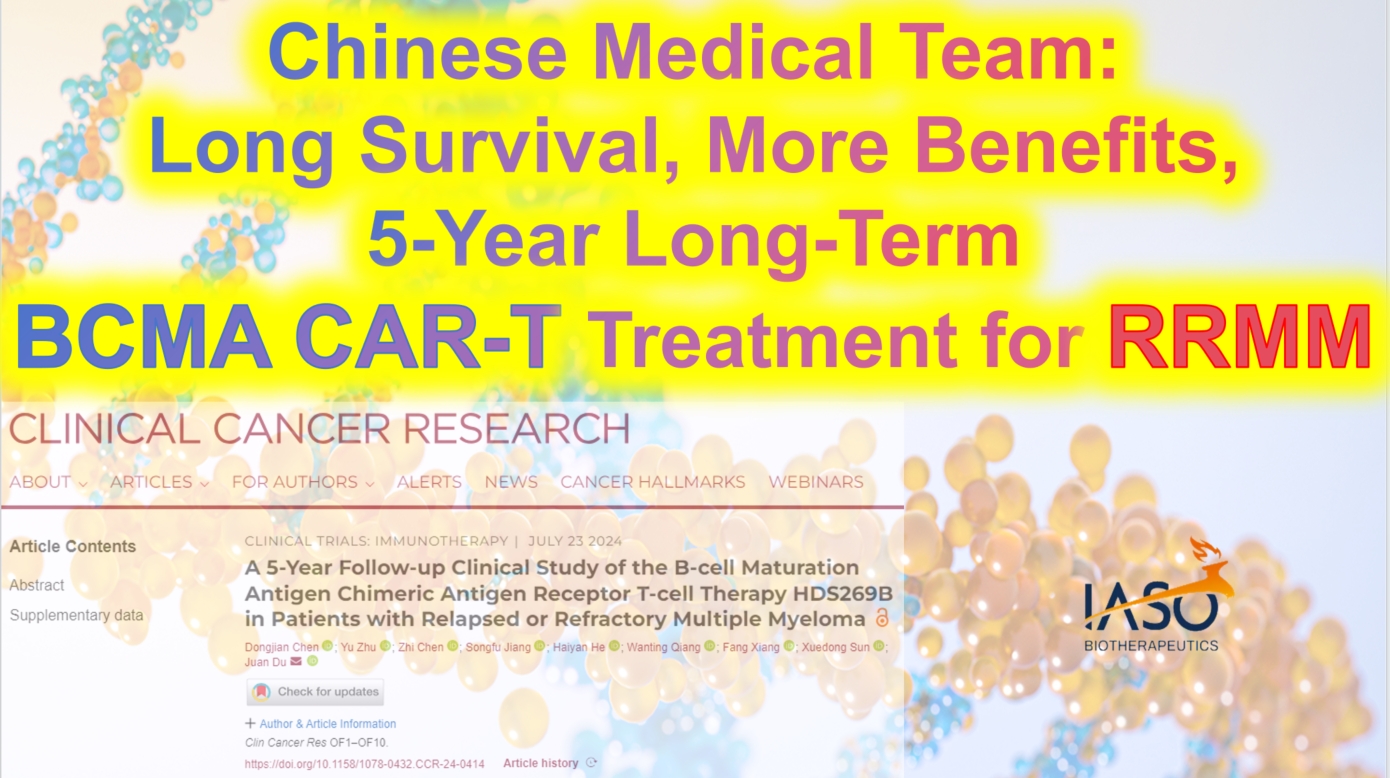
Chinese Medical Team: Long Survival and Significant Benefits with BCMA CAR-T Treatment for RRMM: A 5-Year Outlook
**Chinese Medical Team: Long Survival and Significant Benefits with BCMA CAR-T Treatment for RRMM: A 5-Year Outlook**

RRMM
Chimeric antigen receptor (CAR) T-cell therapy is one of the most promising new treatments for relapsed/refractory multiple myeloma (RRMM), but reports on its long-term efficacy and safety are limited. As early as 2022, Professor Du Juan’s team from the Department of Hematology at Shanghai Changzheng Hospital published a Phase I/II study demonstrating that patients with poor physical status could also benefit from CAR-T therapy. Recently, the team updated their findings with a five-year long-term follow-up, focusing on factors affecting long-term clinical benefits. The results were published in *Clinical Cancer Research*. The following summary of the study’s content is provided by *Cancer Information* for readers’ benefit.
### Evidence for Long-Term Efficacy and Safety of BCMA CAR-T Cell Therapy
#### Patient Characteristics
The study included 49 RRMM patients who had all received at least three prior lines of therapy before undergoing BCMA CAR-T cell treatment. At enrollment, 20 patients (40.82%) had poor physical status (ECOG performance status of 3-4), 42.86% had high-risk cytogenetic features, and 63.27% had received four or more lines of treatment. At the time of infusion, 79.59% had progressive disease. Among the patients with poor physical status, 30% had extramedullary disease (EMD), 45% had high-risk cytogenetic features, 70% had received four or more lines of treatment, and 80% had progressive disease after their last line of treatment.
#### Efficacy Evaluation of BCMA CAR-T Cell Therapy HDS269B
After a median follow-up of 59.0 months, the study showed an overall response rate (ORR) of 77.55%. The ORR was similar across patients with different ECOG scores. The median progression-free survival (PFS) was 9.5 months, and the median overall survival (OS) was 20.0 months. The five-year PFS and OS rates were 21.3% and 31.4%, respectively. For patients with ECOG scores of 0-2, the median PFS was 11.0 months, compared to 4.0 months for those with scores of 3-4 (P=0.18). The median OS was 41.8 months for ECOG 0-2 patients and 10.5 months for ECOG 3-4 patients (P=0.015).
Patients who had previously undergone four or more lines of therapy had significantly shorter PFS and OS compared to those who had received fewer than four lines (PFS: P=0.012; OS: P=0.0049). Among the 11 patients with EMD at enrollment, the ORR was 64% for those with EMD and 82% for those without EMD. However, median PFS and OS were notably shorter in patients with EMD (PFS: 3.0 months vs. 10.5 months, P=0.06; OS: 5.0 months vs. 24.0 months, P=0.03).
#### MRD-Negative Status and CAR-T Cell Persistence Indicate Better Long-Term Survival
Minimal residual disease (MRD) negativity was significantly associated with longer PFS and OS. In this study, MRD data were available for 22 patients on day 28 post-infusion, with 14 patients (63.64%) achieving MRD negativity (10^-4). These patients experienced significantly longer PFS and OS compared to MRD-positive patients. Similar associations were observed with MRD status at 3 and 6 months post-infusion.
The expansion of CAR-T cells was also closely related to clinical outcomes. Patients who achieved partial response (PR) or better had higher CAR-T cell peak levels. Patients without disease progression five years post-infusion had significantly higher CAR-T cell expansion peaks than those with progression. Additionally, the duration of CAR-T cell persistence correlated with longer PFS and OS, with patients having CAR-T cells persisting for ≥6 months, ≥12 months, ≥24 months, and ≥36 months showing significantly better PFS and OS than those without detectable CAR-T cells.
#### Controlled Safety Profile of BCMA CAR-T Cell Therapy HDS269B
No new CAR-T cell-related toxicities were observed during long-term follow-up. All patients experienced at least one adverse event (AE), with the most common long-term (≥28 days post-infusion) grade ≥3 AEs being hematologic in nature. No second primary malignancies or delayed immune effector cell-associated neurotoxicity syndrome (ICANS) were observed.
This study also included survival analysis, classifying patients by PFS and OS. The results indicated that ECOG 0-2 status, fewer than four prior therapies, and CAR-T cell persistence for ≥6 months were independently associated with longer survival.
### The Potential of BCMA CAR-T Therapy and the Need for Future Optimization
Through a five-year long-term follow-up of 49 RRMM patients, this study systematically evaluated the efficacy and safety of BCMA CAR-T cell therapy HDS269B. The findings suggest that poor physical status is not a contraindication for CAR-T therapy, thus broadening the indications for this treatment. While the results are encouraging, the study has some limitations, including its open-label, single-arm design and small sample size, which, combined with the long follow-up period, could lead to some patient attrition. Furthermore, despite the lack of new severe toxicities, long-term safety requires continued observation.
Overall, this study underscores the importance of BCMA CAR-T cell therapy in the treatment of RRMM and provides a crucial basis for exploring and applying CAR-T immunotherapy in the frontline treatment of multiple myeloma.

 To assess whether the condition is suitable for CAR-T or clinic therapy, you can submit Advanced Medicine in China for preliminary evaluation!
To assess whether the condition is suitable for CAR-T or clinic therapy, you can submit Advanced Medicine in China for preliminary evaluation!
WhatsApp: +86137 1795 9070
Email: doctor.huang@globecancer.com
#CAR_Therapy #BCMACART #MultipleMyeloma #CancerResearch #LongTermSurvival #MedicalInnovation #Hematology #CancerTreatment #Immunotherapy #OncologyAdvances
Warning: Trying to access array offset on value of type bool in /www/wwwroot/www.medtourcn.com/wp-content/themes/medical-directory/framework/theme/medicaldirectory-image.php on line 78
Warning: Trying to access array offset on value of type bool in /www/wwwroot/www.medtourcn.com/wp-content/themes/medical-directory/framework/theme/medicaldirectory-image.php on line 79

แสงแห่งความหวังใหม่: การเดินทางเพื่อการรักษาข้ามพรมแดนของผู้ป่วยชาวไทย
**แสงแห่งความหวังใหม่: การเดินทางเพื่อการรักษาข้ามพรมแดนของผู้ป่วยชาวไทย**
ที่แผนกโลหิตวิทยา โรงพยาบาลตงจี้เซี่ยงไฮ้ ผู้อำนวยการหลี่ผิง แพทย์ผู้รับผิดชอบการรักษาคุณ P ผู้ป่วยชาวไทยสูงอายุ ได้ให้รายละเอียดเกี่ยวกับภาวะมะเร็งเม็ดเลือดขาวชนิดมัลติเพิลมัยอิโลมาและประวัติการรักษาของเธอ สถานการณ์ของคุณ P มีความผันผวนอย่างมาก เนื่องจากเธอได้รับการรักษาหลายครั้งในประเทศไทย แต่โรคกลับมาเป็นซ้ำอีก ในที่สุดเธอได้เลือกและเชื่อมั่นในการรักษาด้วย CAR-T ในประเทศจีน ด้วยความหวังสุดท้าย
ผู้อำนวยการหลี่กล่าวด้วยความซาบซึ้งว่า “คุณ P เป็นนักสู้ที่กล้าหาญ และความกล้าหาญของเธอทำให้ฉันรู้สึกซาบซึ้ง แม้ว่าการรักษาด้วย CAR-T จะมีผลข้างเคียงอยู่บ้าง แต่เรามั่นใจว่าด้วยการจัดการอย่างมีวิทยาศาสตร์และประสบการณ์ที่กว้างขวางของทีมของเรา เราสามารถให้การดูแลและการป้องกันที่ดีที่สุดแก่เธอได้” เธอย้ำว่า การใช้ยาที่มี CAR-T มนุษย์เต็มตัวอย่าง FUCASO ซึ่งมีภูมิคุ้มกันต่ำ ทำให้ความเสี่ยงของผลข้างเคียงลดลงอย่างมาก มอบความหวังในการหายขาดให้กับผู้ป่วยมากขึ้น
ผู้อำนวยการหลี่และทีมของเธอยังคงยืนหยัดอยู่ในแนวหน้าของการรักษา โดยใช้ประสบการณ์และความเชี่ยวชาญที่กว้างขวางเพื่อให้บริการทางการแพทย์ที่มีคุณภาพสูงสุดแก่ผู้ป่วยทุกคน พวกเขาไม่ได้เพียงแค่รักษาโรค แต่ยังรักษาความหวังและความฝันของทุกครอบครัว ในการต่อสู้กับโรคนี้ พวกเขายืนหยัดร่วมกับผู้ป่วย ทำงานร่วมกันเพื่อมุ่งสู่อนาคตที่สดใส
ให้เราร่วมกันติดตามการเดินทางสู่การฟื้นคืนชีพของเธอที่โรงพยาบาลตงจี้ต่อไป
#การรักษาCAR_T #ผู้ป่วยชาวไทย #โรงพยาบาลตงจี้เซี่ยงไฮ้ #มัลติเพิลมัยอิโลมา #กลุ่มอาการการปลดปล่อยไซโตไคน์ #การรักษามะเร็ง #นวัตกรรมการแพทย์ #การแพทย์ข้ามพรมแดน #HopeReborn #CARTherapy #TongjiHospital #Shanghai #FUCASO #Equecel #MultipleMyeloma #PatientJourney #MedicalBreakthrough #CrossBorderTreatment #CancerSurvivor
Warning: Trying to access array offset on value of type bool in /www/wwwroot/www.medtourcn.com/wp-content/themes/medical-directory/framework/theme/medicaldirectory-image.php on line 78
Warning: Trying to access array offset on value of type bool in /www/wwwroot/www.medtourcn.com/wp-content/themes/medical-directory/framework/theme/medicaldirectory-image.php on line 79

Expert Perspective: Side Effects and Management of CAR-T Therapy for a Thai Patient
**Expert Perspective: Side Effects and Management of CAR-T Therapy for a Thai Patient**
At the Hematology Department of Shanghai Tongji Hospital, Dr. Li Ping, the chief physician for the elderly Thai patient Ms. P, provided a detailed overview of the patient’s multiple myeloma condition and treatment journey. After experiencing multiple treatments and relapses in Thailand, the patient ultimately chose and trusted CAR-T therapy in China. Dr. Li highlighted that the most common side effect is cytokine release syndrome (CRS), which manifests as fever, hypotension, and difficulty breathing. While most CRS cases are mild to moderate, severe CRS can be life-threatening. She also emphasized that through scientific management, the team’s extensive experience, and the low immunogenicity of the fully human CAR-T product FUCASO, the side effects of CAR-T therapy can be effectively controlled, offering the patient hope for a cure.
We will continue to follow up on this patient’s treatment progress and provide updates.
#CARTherapy #MultipleMyeloma #FUCASO #Equecel #TongjiHospital #Shanghai #MedicalInnovation #CancerTreatment #Hematology #PatientJourney #Immunotherapy
Warning: Trying to access array offset on value of type bool in /www/wwwroot/www.medtourcn.com/wp-content/themes/medical-directory/framework/theme/medicaldirectory-image.php on line 78
Warning: Trying to access array offset on value of type bool in /www/wwwroot/www.medtourcn.com/wp-content/themes/medical-directory/framework/theme/medicaldirectory-image.php on line 79

Chinese Medical Team: Sequential CD20 CAR-T Therapy Outperforms Salvage Chemotherapy for CD19 CAR-T Resistant B-Cell Lymphoma Patients
## Chinese Medical Team: Sequential CD20 CAR-T Therapy Outperforms Salvage Chemotherapy for CD19 CAR-T Resistant B-Cell Lymphoma Patients

CAR-T therapy
In recent years, with the application of CD19 CAR-T in refractory/relapsed B-cell lymphoma, we have encountered patients for whom CD19 CAR-T therapy was ineffective or who relapsed shortly after initial success. While research continues to explore factors that may affect the efficacy of CD19 CAR-T therapy, doctors and scholars are actively seeking more effective treatments for these patients. In June of this year, Professor Ke Xiaoyan and Professor Hu Kai from the Lymphoma and Myeloma Department of Beijing Gaobo Hospital published an article titled “Salvage CD20-SD-CART Therapy in Aggressive B-Cell Lymphoma After CD19 CART Treatment Failure” in the journal *Frontiers in Oncology*. This study provides new insights for treating B-cell lymphoma patients who have failed CD19 CAR-T therapy.
### Efficacy of Sequential CD20 CAR-T Therapy Exceeds Salvage Chemotherapy Post-CD19 CAR-T Failure
Regarding the innovation of this research, Professor Hu Kai pointed out that international scholars currently focus on chemotherapy (including new drugs), targeted drug therapy, and allogeneic hematopoietic stem cell transplantation for B-cell lymphoma patients who have failed CD19 CAR-T therapy. However, there is limited data on switching targets for a second CAR-T therapy. Our team summarized the treatment outcomes of 93 B-cell lymphoma patients who failed CD19 CAR-T therapy. Among them, 54 out of 93 (58%) chose sequential CD20-targeted second CAR-T therapy, and 39 out of 93 (42%) opted for chemotherapy combined with new drugs and targeted therapy. The results showed that the complete remission rate (CRR) in the sequential CD20 CAR-T group was significantly higher than in the chemotherapy group, with rates of 27.8% and 7.9%, respectively (P=0.03).
After a median follow-up period of 18.54 months, the sequential CD20 CAR-T group showed a significantly longer median progression-free survival (4.04 months vs. 2.27 months, P=0.0032) and median overall survival (8.15 months vs. 3.02 months, P<0.0001) compared to the non-CAR-T group. Multivariate analysis further confirmed that sequential CD20-targeted second CAR-T therapy is an independent factor associated with improved overall survival (HR 0.28, 95%CI: 0.16-0.51; P<0.0001) and progression-free survival (HR 0.46, 95%CI: 0.27-0.8; P=0.005).
### Safety of Sequential CD20-Targeted Second CAR-T Therapy
The study noted that the incidence of severe CRS (≥ grade 3) and ICANS (≥ grade 3) was relatively low during the sequential CD20-targeted second CAR-T therapy, at 9.2% and 7.4%, respectively, with complete recovery after treatment. Other adverse reactions were also controllable.
### Factors Affecting the Efficacy of Second CAR-T Therapy
We used a univariate regression model to evaluate factors affecting the response to sequential CD20-targeted second CAR-T therapy. An IPI score of ≥3 (OR 0.3, 95%CI: 0.10-0.93, P=0.04) was significantly associated with a lower overall response rate (ORR). Additionally, ECOG PS ≥3 (HR 3.12, 95%CI: 1.23-7.94, P=0.02) was associated with decreased progression-free survival and overall survival.
### Study Commentary
Professor Ke Xiaoyan highlighted that the Lymphoma and Myeloma Department at Beijing Gaobo Hospital has accumulated extensive experience with CAR-T therapy in recent years. As the number of CAR-T cases increases in real-world scenarios, CD19 CAR-T may cure half of the patients with relapsed/refractory B-cell lymphoma. For patients who fail CD19 CAR-T therapy, clinical problems become more complex. Our experience suggests that selecting CD20-targeted second CAR-T therapy based on the expression of surface antigens on recurrent tumors can still achieve better results than salvage chemotherapy, extend patient survival, and maintain controllable safety. Tumor burden and the patient’s physical condition remain factors affecting the efficacy of sequential CD20 CAR-T therapy.
🎉🎉To assess whether the condition is suitable for CAR-T or clinic therapy, you can submit Advanced Medicine in China for preliminary evaluation!
WhatsApp: +8613717959070
Email: doctor.huang@globecancer.com
#CAR-T #CancerTreatment #LymphomaResearch #MedicalAdvancements #CD19CAR-T #CD20CAR-T #Oncology #ClinicalResearch #CancerSurvivorship #MedicalBreakthroughs
Warning: Trying to access array offset on value of type bool in /www/wwwroot/www.medtourcn.com/wp-content/themes/medical-directory/framework/theme/medicaldirectory-image.php on line 78
Warning: Trying to access array offset on value of type bool in /www/wwwroot/www.medtourcn.com/wp-content/themes/medical-directory/framework/theme/medicaldirectory-image.php on line 79
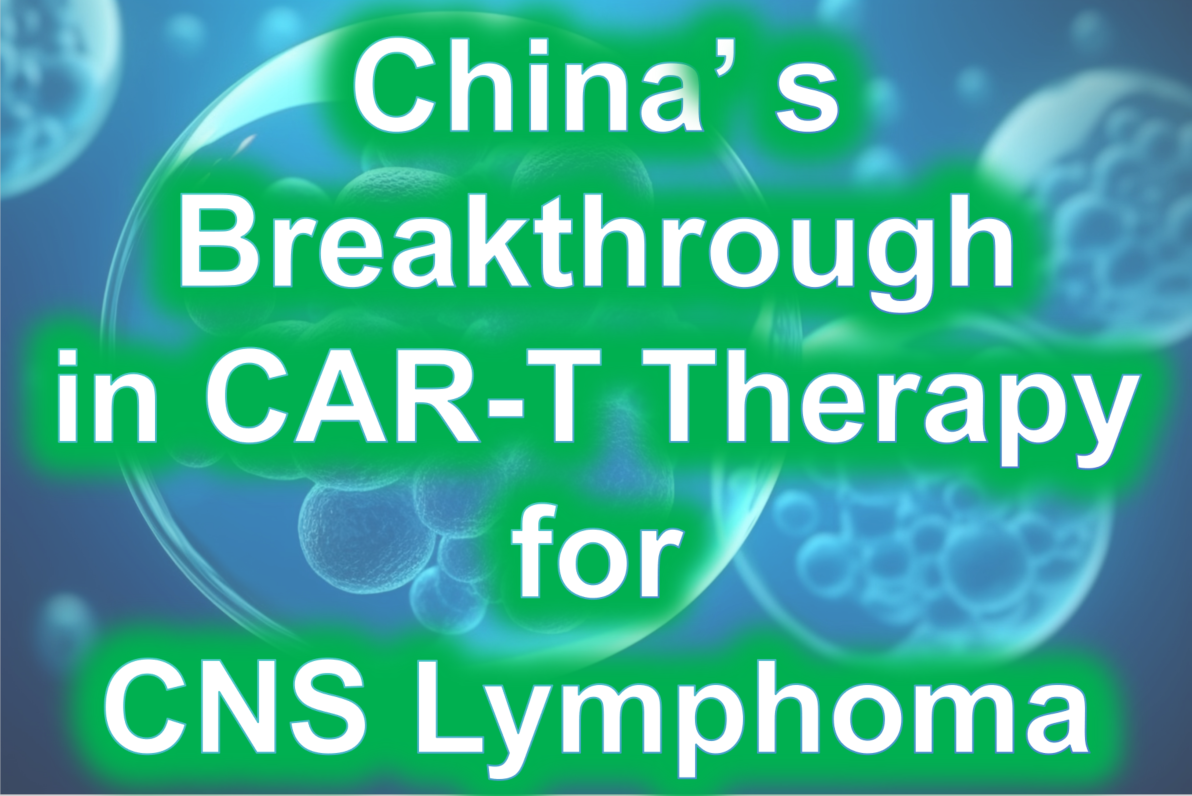
China’s Breakthrough in CAR-T Therapy for CNS Lymphoma
### China’s Breakthrough in CAR-T Therapy for CNS Lymphoma
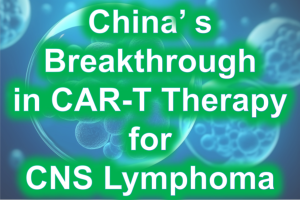
Lymphoma
In a pioneering effort to improve outcomes for patients with refractory/relapsed central nervous system lymphoma (CNSL), a multi-center retrospective study led by Professor Jianqing Mi from Ruijin Hospital, Shanghai Jiaotong University School of Medicine, has showcased the impressive real-world effectiveness of Relmacabtagene Autoleucel (Relma-cel). This study, encompassing data from 12 centers across China, represents the largest sample size for a real-world study on commercial CAR-T therapy in treating CNSL, and its results have been recently published in the *Journal for ImmunoTherapy of Cancer*.
### Study Overview and Patient Demographics
The study included 22 patients aged 18 and above, all diagnosed with CD19+ refractory or relapsed CNSL. These patients had previously undergone various systemic treatments, including CD20 monoclonal antibody immunochemotherapy and high-dose methotrexate-based therapies. Of the participants, 12 had primary CNSL and 10 had secondary CNSL. The median age was 56, with 45.5% being over 60 years old. The study focused on a high-risk group, with many having a Karnofsky Performance Status (KPS) score of ≤60, multiple prior treatment lines, and/or high-risk genetic profiles such as double-hit lymphoma (DHL).
### Treatment and Response
Patients received Relma-cel with a median interval of 32 days between apheresis and infusion. Thirteen patients received a single CAR-T cell infusion, while nine underwent autologous stem cell transplantation (ASCT) in combination with CAR-T infusion. Notably, 20 patients received bridging therapy to control disease before CAR-T infusion. The overall response rate (ORR) was 90.9%, with a complete response (CR) rate of 68.2%. Impressively, all patients achieved CNS response, with 72.7% achieving CNS CR. The median time to response was one month.
### Follow-Up and Survival Outcomes
The median follow-up period was 316 days. Among the 16 patients who achieved CNS response, 81.3% remained alive and in remission, with half maintaining CNS CR for over a year. The study reported a one-year progression-free survival (PFS) rate of 64.4%, duration of response (DOR) rate of 71.5%, and overall survival (OS) rate of 79.2%. Key predictors of better outcomes included achieving CR before infusion and having non-progressive disease at the time of infusion.
### Safety and Tolerability
The safety profile of Relma-cel was acceptable. Cytokine release syndrome (CRS) occurred in 72.7% of patients, primarily grade 1 or 2, with only one case of grade 3. Immune effector cell-associated neurotoxicity syndrome (ICANS) was reported in 36.4% of patients, mostly grade 1 or 2. There were no CAR-T therapy-related deaths, although five patients (22.7%) died, with three deaths due to disease progression and two from non-relapse causes (COVID-19).
### CAR-T Cell Dynamics and Combined Therapy
The study also explored the pharmacokinetics of CAR-T cells. Relma-cel showed significant expansion in the peripheral blood within the first 28 days post-infusion, with CAR-T cells detected in the cerebrospinal fluid of all evaluable patients. Interestingly, patients receiving additional immunotherapies like BTK inhibitors or PD-1 inhibitors exhibited CAR-T cell re-expansion, suggesting potential synergistic effects.
### Conclusion and Future Directions
This landmark study underscores the clinical efficacy and manageable safety profile of Relma-cel for treating CNSL in a real-world setting. It highlights the potential benefits of combining CAR-T therapy with other immunotherapies, offering a promising strategy for enhancing CAR-T cell persistence and effectiveness. These findings pave the way for future research, suggesting the need for larger, randomized studies to further validate these results and explore the role of CAR-T therapy as a consolidation treatment for high-risk CNSL patients. As China continues to advance in medical research and technology, studies like this are crucial in providing valuable insights and improving global healthcare standards.
🎉🎉To assess whether the condition is suitable for CAR-T or clinic therapy, you can submit Advanced Medicine in China for preliminary evaluation!
WhatsApp: +8613717959070
Email: doctor.huang@globecancer.com
#CARTTherapy #CNSLymphoma #CancerResearch #MedicalBreakthrough #ChinaHealthcare #Immunotherapy #RelmaCel #PatientOutcomes #InnovativeTreatment #ClinicalStudy
Warning: Trying to access array offset on value of type bool in /www/wwwroot/www.medtourcn.com/wp-content/themes/medical-directory/framework/theme/medicaldirectory-image.php on line 78
Warning: Trying to access array offset on value of type bool in /www/wwwroot/www.medtourcn.com/wp-content/themes/medical-directory/framework/theme/medicaldirectory-image.php on line 79
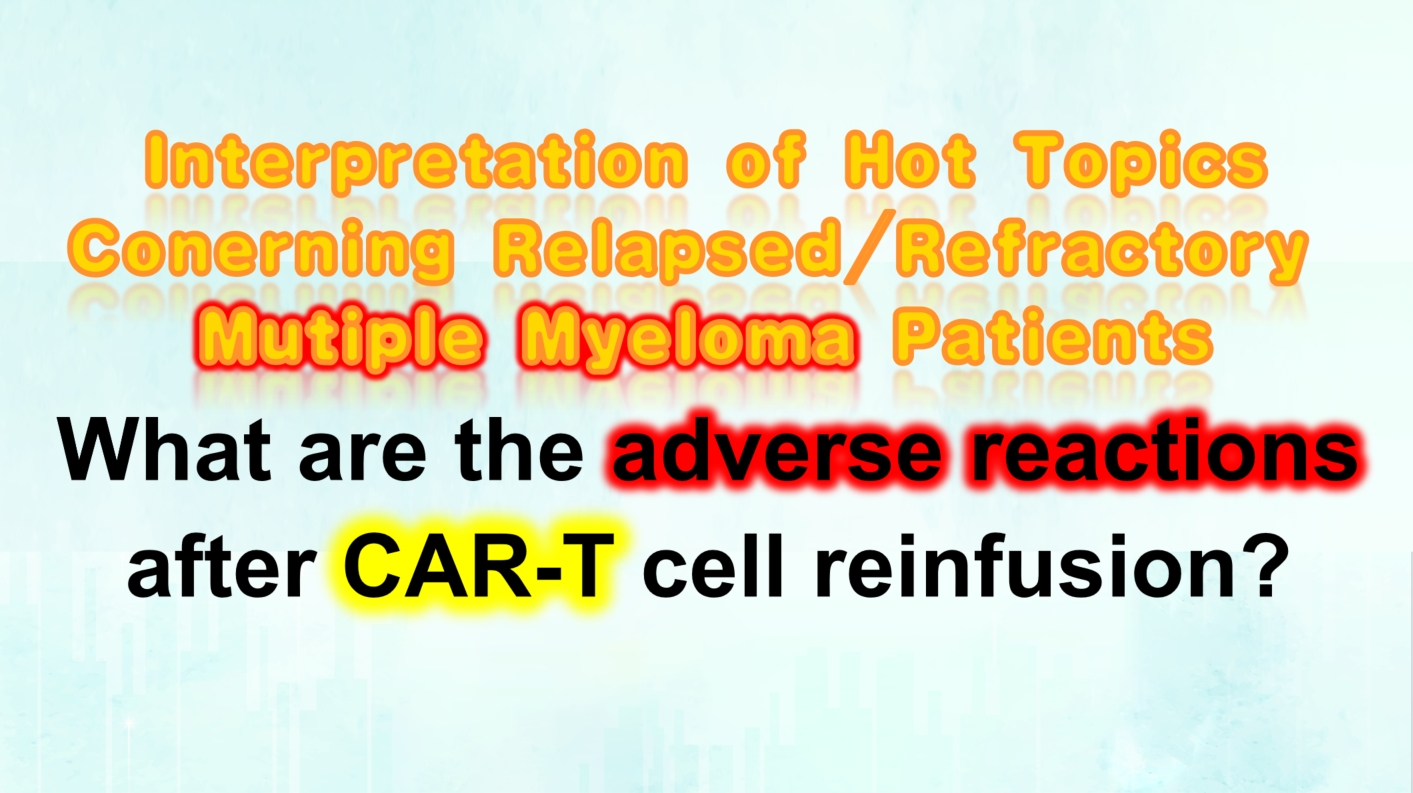
What are the adverse reactions after CAR-T cell reinfusion?
 Interpretation of Hot Topics Conerning Mutiple Myeloma Patients:
Interpretation of Hot Topics Conerning Mutiple Myeloma Patients:
 “What are the adverse reactions after CAR-T cell reinfusion?”
“What are the adverse reactions after CAR-T cell reinfusion?”
Process Diagram for Myeloma Patients Receiving CAR-T Therapy
RRMM(Relapsed/Refractory Multiple Myeloma)
Unveiling how the “million-dollar anti-cancer shot” saves patients with recurrent and refractory bone tumors! Taking you through the entire process of CAR-T therapy.
 CAR-T细胞回输后有哪些不良反应?
CAR-T细胞回输后有哪些不良反应?
骨髓瘤患者接受CAR-T治疗的流程图
权威专家解读之骨髓瘤全程管理
Expert Introduction
Chief Phsician Professor Doctoral Supervisor
Peking University People’s Hospital,
Peking University Institute of Hematology
Director-General and Standing Committee of Hematolog Branch of Chinese Phsicians Association
Memer of the International Meloma oring Group Asia-Pacific Meloma oring Group
Associate Leader Plasma Ctolog Group Hematolog Branch Chinese Medical Association
Memer of the China and International Collaorative Group on Primar Sstemic Amloidosis
President of Hematologists Branch of Beiing Phsicians Association
Memer of International Research Group on Renal and Monoclonal lmmunogloulinopathies
Vice President of Hematolog Branch of Chinese Geriatrics Association and Chairman of Academic Commitee on Muliple Meloma
Associate Leader Multiple Meloma and Related Diseases Group Hematolog Committee Chinese Association of Female Phsicians

 To assess whether the condition is suitable for CAR-T or clinic therapy, you can submit Advanced Medicine in China for preliminary evaluation!
To assess whether the condition is suitable for CAR-T or clinic therapy, you can submit Advanced Medicine in China for preliminary evaluation!
WhatsApp: +8613717959070
Email: doctor.huang@globecancer.com
#CART #Mutiplemyeloma #carttherapy #myeloma #leukemia #drug #RRMM #cancer #cancertreatment #tcell #cell #advancedmedical #AdvancedMedicineinChina
Warning: Trying to access array offset on value of type bool in /www/wwwroot/www.medtourcn.com/wp-content/themes/medical-directory/framework/theme/medicaldirectory-image.php on line 78
Warning: Trying to access array offset on value of type bool in /www/wwwroot/www.medtourcn.com/wp-content/themes/medical-directory/framework/theme/medicaldirectory-image.php on line 79
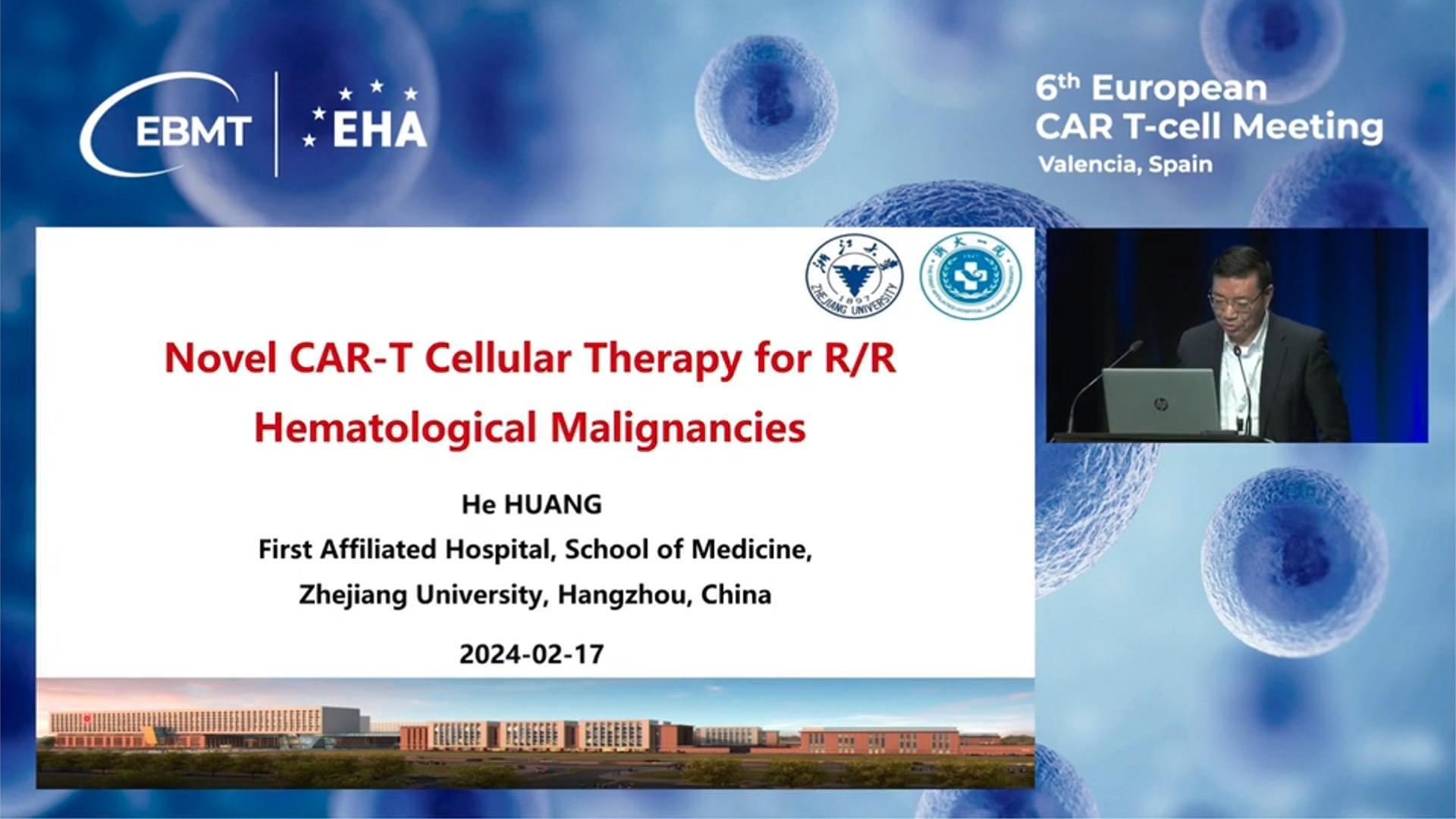
#EBMT / #EHA Leading the Frontiers of Medicine: China’s Top Medical Expert Explains the Groundbreaking CAR-T Cell Therapy
#EBMT / #EHA Leading the Frontiers of Medicine: China’s Top Medical Expert Explains the Groundbreaking CAR-T Cell Therapy
Expert:**Huang He**
Chief Physician and Doctoral Supervisor.
Currently serves as the Director of the Hematology Institute at Zhejiang University, Director of the Zhejiang Provincial Engineering Research Center for Stem Cell and Cellular Immunotherapy, Chief Scientist for the “Hematology and Immunology Diseases” division at the Liangzhu Laboratory, and Director of the Bone Marrow Transplantation Center at the First Affiliated Hospital of Zhejiang University School of Medicine.
He is the Vice Chairman of the Asia Cell Therapy Organization and Deputy Leader of the Hematopoietic Stem Cell Application Group of the Hematology Branch of the Chinese Medical Association.
He has published over 300 papers (including over 200 as corresponding author) in journals such as The New England Journal of Medicine, Nature, Cell Metabolism, Lancet Haematology, Blood, and Leukemia.
He has received 17 provincial and ministerial-level awards and holds 23 authorized invention patents.
In the past five years, he has served as chairperson, invited speaker, and oral presenter at over 60 international conferences. As the conference chair, he organized the Asia-Pacific International Bone Marrow and Hematopoietic Stem Cell Transplantation Conference in Hangzhou in 2005 and 2014.
He is the chief editor of “CAR-T Cell Immunotherapy” and “Hematology” published by People’s Medical Publishing House.
He serves on the editorial boards and committees of multiple international journals and organizations.

 To assess whether the condition is suitable for CAR-T or clinic therapy, you can submit Advanced Medicine in Chinafor preliminary evaluation!
To assess whether the condition is suitable for CAR-T or clinic therapy, you can submit Advanced Medicine in Chinafor preliminary evaluation!
WhatsApp:+8613717959070
Email: doctor.huang@globecancer.com
#MedicalInnovation #CAR_Therapy #Hematology #MedicalBreakthrough #ExpertTalks #CuttingEdgeMedicine #cart #EHA2024
